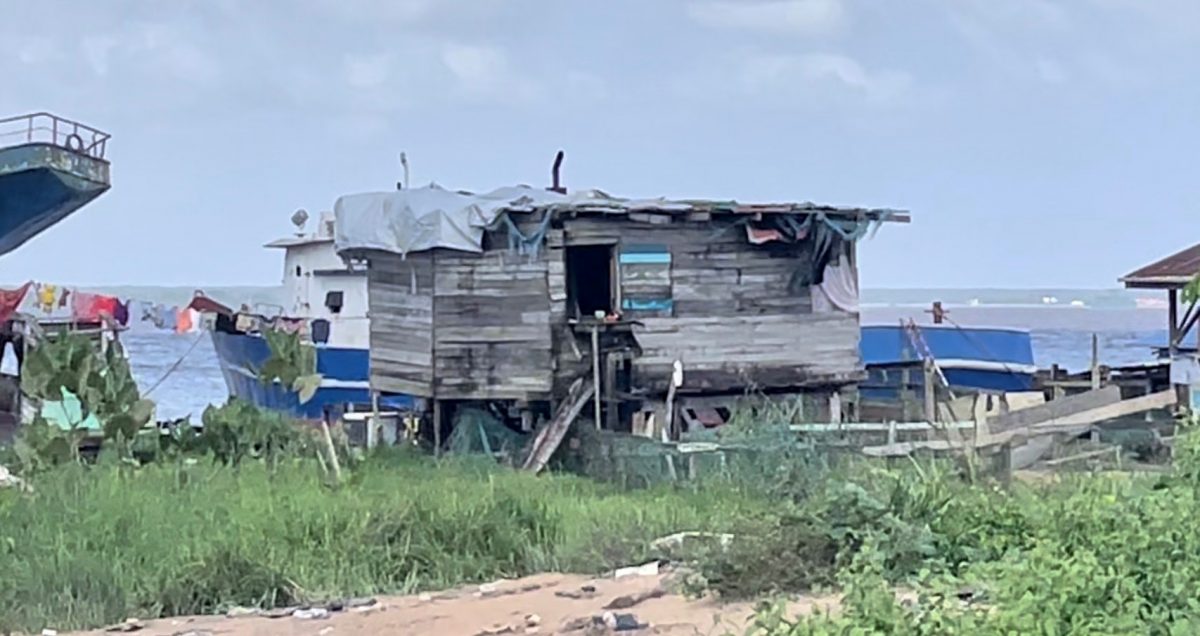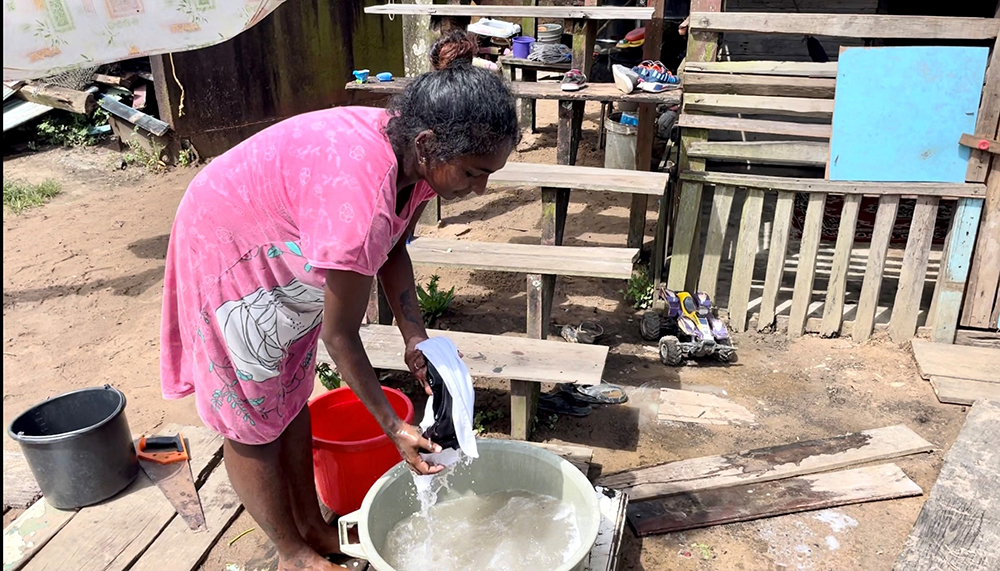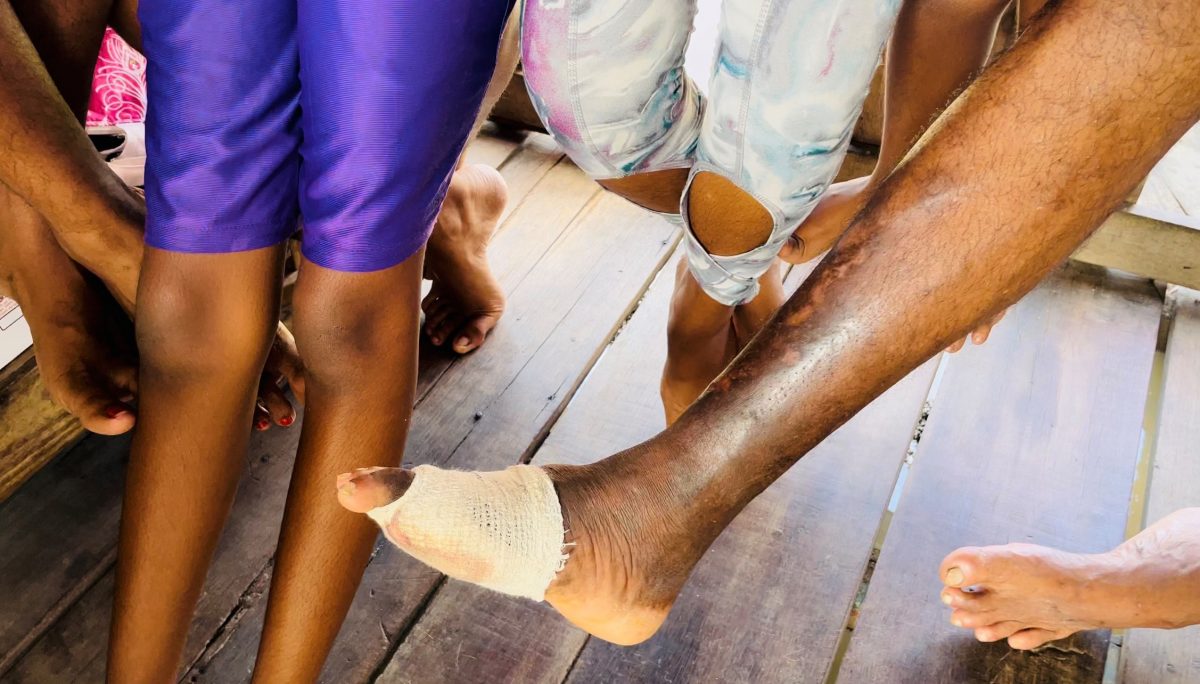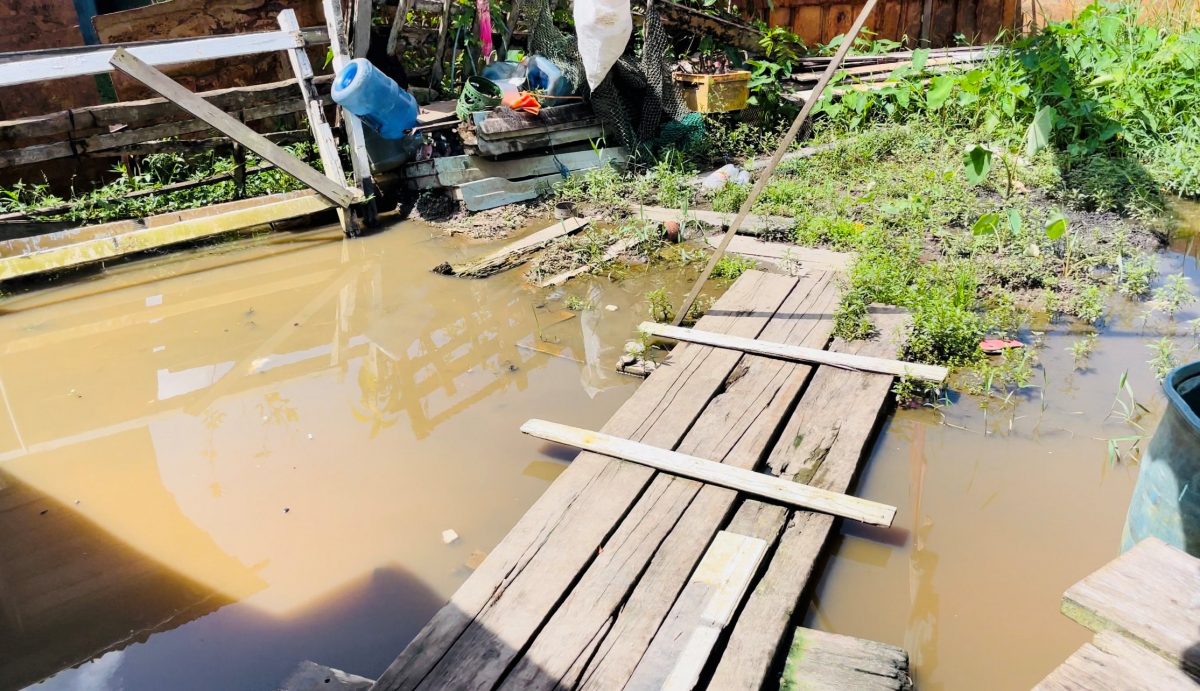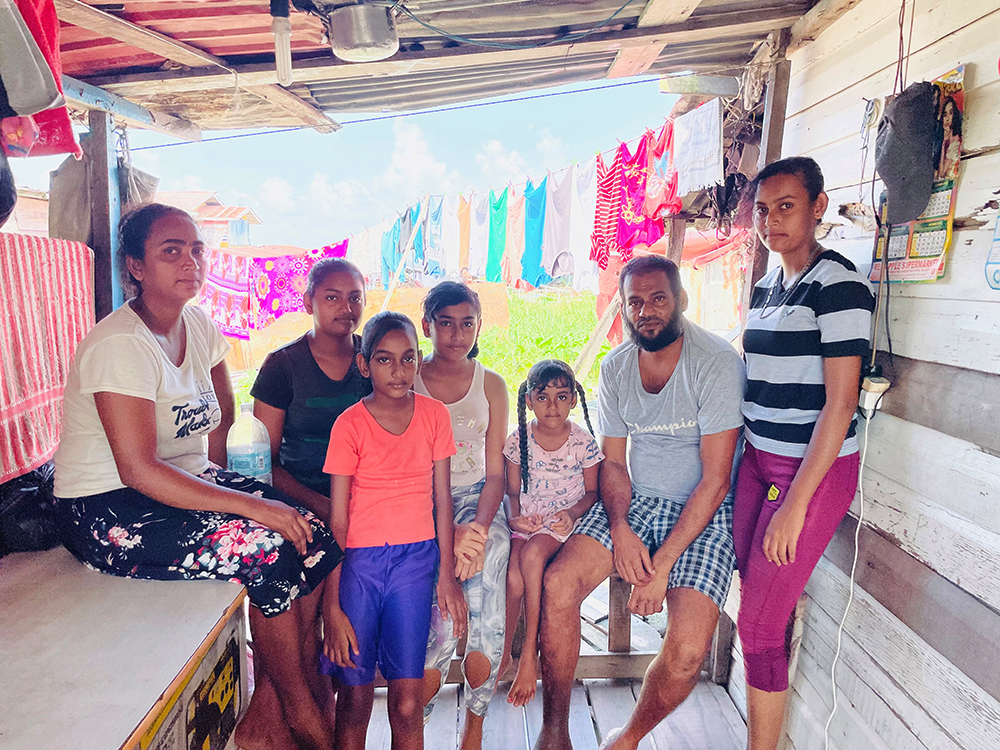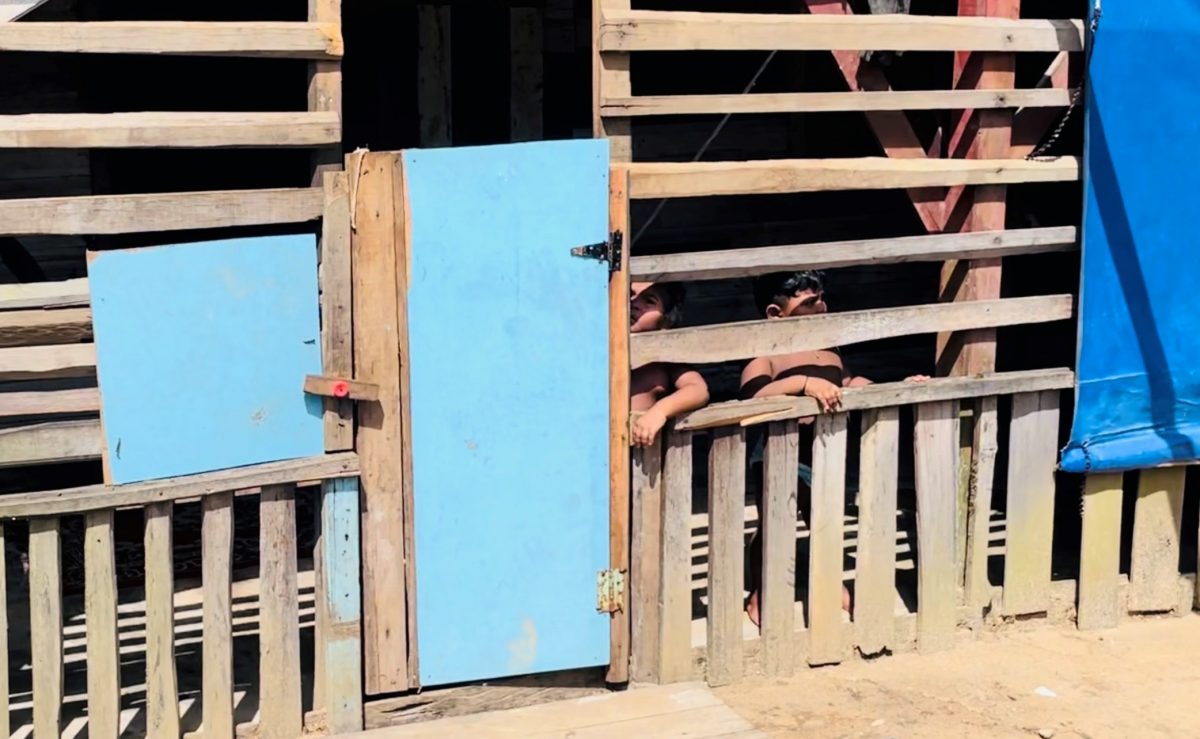Despite the fact that Guyana has earned three years of oil money amounting to about US$2b, Parika Sea Dam is one of the many areas in all parts of the country that remain completely untouched and residents are disconsolate and unsure of their future prospects.
During a visit by the Sunday Stabroek, Ramesh Takah, 44, sat on the porch of his dilapidated house at Parika Sea Dam on the East Bank of Essequibo with his toes bandaged. He was looking at the floodwaters that surrounded his yard and was stressed out that he was unable to do any gardening.
He is diabetic and had injured the second toe on his right foot while trying to dig a drain to release the floodwaters. The toe eventually had to be amputated.
The flooding was as a result of heavy rainfall and the water remained on the land because some residents had blocked the drainage with metal sheets.
Ramesh lives with wife, six daughters and a son. He works as a labourer on a boat but is unable to do that right now. Sometimes he gets a little money to “watchman boats” when they dock near his home.
He has to rely on relatives for assistance but they too are facing financial difficulties.
And as if he hasn’t suffered enough, he has started to lose vision in his right eye apparently from his uncontrolled diabetes.
This family is among many residents who are living in extreme poverty on the Parika Sea Dam. They are struggling to make ends meet and many are not sure where the next meal would come from.
They also live in run-down houses and are desperate for help to fix them. The deplorable mud road has huge potholes that are filled with water after heavy rainfall, while the yards are flooded during the spring tide.
When it rains the children have a difficult time to traverse the road to go to school and to clean their muddied footwear.
The residents do not benefit from electricity and have no access to potable water. They rely mainly on rain water for cooking and drinking.
The area is not regularised and no one in authority has ever visited to address their concerns so they can have some relief.
Over 40 years ago when the residents had no other place to live, they started squatting on the sea dam in tiny shacks. They endured hardships from the harsh conditions but they were never able to improve their lives.
Laser surgery
Ramesh had visited the Georgetown Public Hospital and a doctor referred him to a private clinic where he underwent laser surgery for his eyes at a cost of $50,000.
“But it still ain’t get better and I went back to them two times. They did the laser again but like it got worse,” he lamented. The left eye is also going bad but “I tell them (doctors) I wouldn’t do it until the right eye come good.”
He was told that the “veins behind both eyes are swelling and there is bleeding on both sides.” He is very worried because the doctors told him that if the surgery is not done fast enough, he could become blind.
His main problem is that he is not able to control his diabetes. He visits the clinic regularly and uses his medications but it is not helping. “Sometimes it would be below 200 (milligrams per deciliter -mg/dL), but other times it would go over 300 and 400,” he told this newspaper. According to a Mayo Clinic report, “a blood sugar level less than 140 mg/dL is normal.”
Ramesh’s wife, Lalita Singh, chimed in: “It is hard to control because of the stress…” He is becoming depressed from not being able to take care of his family and would be grateful for any help he can get for them.
Lalita said her children always looked forward for Christmas, “their father would buy presents for them and he would dress the house.” This year they would not be able to celebrate and Christmas would be like any ordinary day.
They live in a small wooden house with two bedrooms and tiny living room and kitchen. They have two kerosene stoves and at the time, Lalita was using one to cook a pot of fried boulanger with eddo.
When she runs out of kerosene she would cook on an outdoor fireside right outside her backdoor. A water tank that is used to store rainwater was braced on the back wall.
Their separate wooden bathroom and toilet are located in the yard and boards are set up so they can avoid walking in the floodwaters. In the yard too, is a stand where they would rest their generator to supply current at nights. They are unable to use it now though because they cannot afford to buy the gasoline.
Cycle of poverty
Some people have had the opportunity to move out of the area in search of better lives. But others were not so lucky and have started their families right there.
Nandranie Budhoo, 27, is one such person. She grew up in impoverished conditions and was never able to escape it. Her three son, ages two, seven and eight have also ended up in the cycle of poverty. Her mother is helping her to take care of her eldest son.
Her husband is a push cart operator and she was thankful that the day before this newspaper visited, he had made $1100. He would go out every day to find work but many times he would come back empty-handed and would have no money for food.
For the past nine years they have lived in a ramshackle house and the rusted roofing sheets have holes and are leaking. They have placed a tarpaulin on the roof but rain would still get in. They would then hang a “saucepan to catch the water.”
According to Nandranie, they have never been able to save any money to fix it. She is pleading for help to rebuild the entire house so they can live in comfort. Among the few household items they own are a “bed, a little chair, a kerosene stove and some plates and cups.”
She never celebrated Christmas, and even if she did, her relatives would not go to her house because of the condition. She is not sure if any relative would invite her family to spend the day though.
Spaces
Alita Singh, a 22-year-old pregnant woman, stood at the bottom stairs of her dilapidated house doing laundry while her two children peered through the spaces between the boards used to enclose the bottom flat.
She finally opened the door to let the children, ages three and four, out to play. The house, which belongs to her mother is leaning on one side and is rotting.
It is not safe and they are afraid to live in it but they have nowhere else to go. The veranda recently collapsed and fell to the ground.
Alita started living there with her reputed husband who hails from Wakenaam, four years ago. He does maintenance work on the boats when they dock at the shore but it is not regular.
“He does get two or three days for the week but sometimes he don’t get any work at all,” she related.
He barely earns enough to provide for the family. They have no money to celebrate Christmas or to buy presents for their children and it would be just another day for them.
A short distance away, is Elizabeth Bowlin’s tiny shack. She lives there with her reputed husband, Arjune and five children. Her eldest daughter who is 15, is from a previous relationship and her father is deceased. Her youngest child is two-year-old.
About eight years ago she moved from the Essequibo Coast to the Parika Sea Dam. Since then they have never been able to expand the shack, which has no bedroom and just a little space for a kitchen and their bed. Her husband uses a little spot outside of the house to do his work as a barber.
Not every day he would get clients though so “when the boats come in he would go and see if he get work but he don’t always get.” Life can be challenging for her family especially when it comes to having proper food to eat every day.
They would not be celebrating Christmas but Elizabeth said “how the money come in we would see what to buy and cook that day.”
She dreams of her family getting out of their shabby lifestyle but it can only become a reality “if we get some assistance to build a better house.”
The Sunday Stabroek caught up with Sabita Venus as she was doing laundry in her yard. She lives with her husband, a push cart operator and her 13-year-old daughter. She is finding it hard to cope with the rising cost of living.
“I go to the shop with the little money that my husband work for and I would just buy a few things and the money finish. But we try to make much with the little we get. I won’t really celebrate Christmas. That day for me is just to cook lil food and bake lil cake.”
Like everyone else, Sabita hopes that she and her family can benefit from a “better living condition…”
Tucked away behind many business places and posh houses, residents believe that the Parika Sea Dam is a “forgotten place,” or that many people are not even aware of its existence.
They hoped that by highlighting their plights, people would be empathetic towards their situation and offer some assistance to ease their sufferings.
